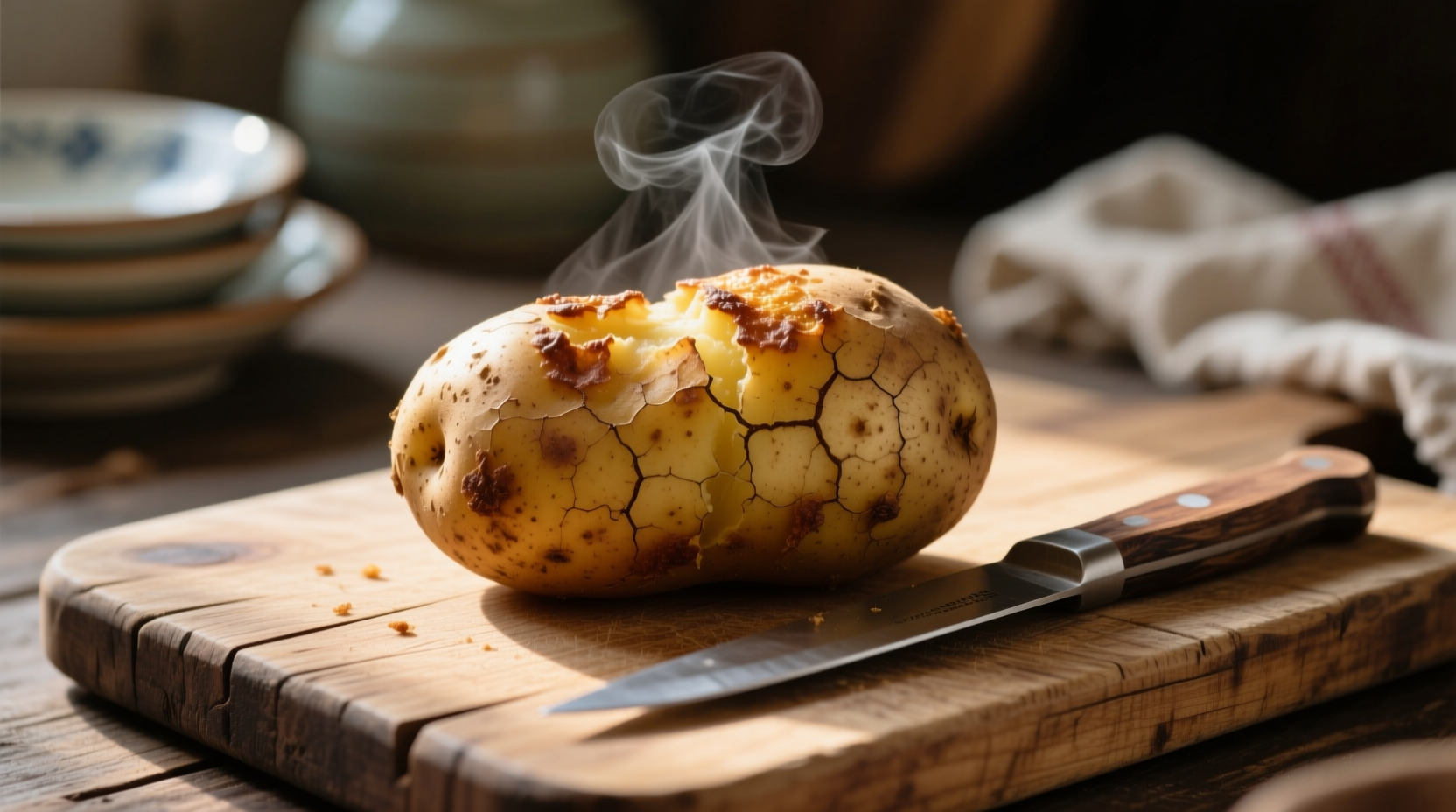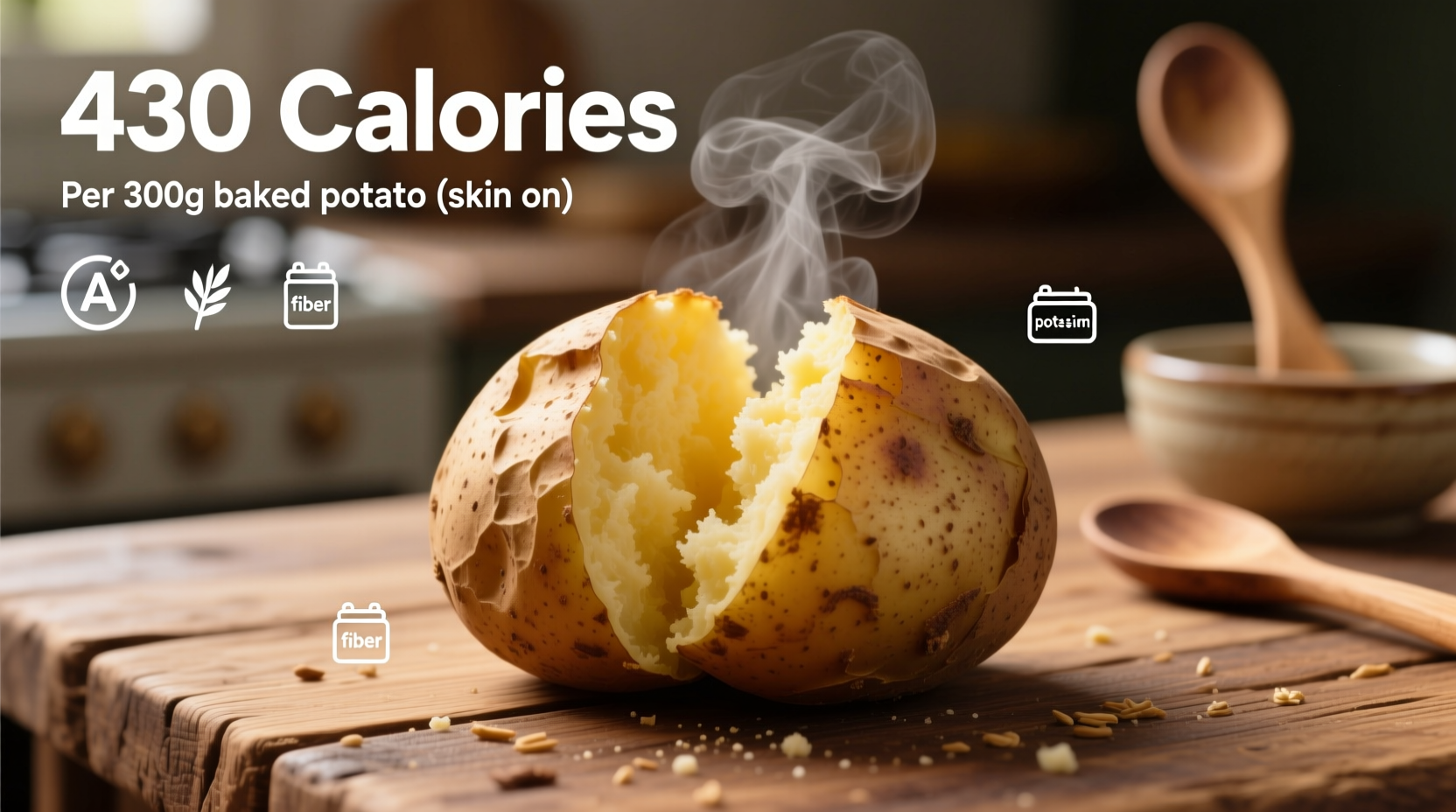When tracking your daily nutrition, knowing the exact calorie content of staple foods like baking potatoes is essential. This comprehensive guide delivers precise, science-backed information to help you make informed dietary choices without unnecessary complexity.
Understanding Baking Potato Nutrition Basics
The term "baking potato" typically refers to Russet potatoes, the fluffy, oval-shaped variety with brown skin perfect for baking. These potatoes form the foundation of many balanced meals, but their nutritional value varies significantly based on size and preparation method.
According to the USDA FoodData Central, the standard nutritional profile for a plain baked Russet potato with skin includes:
| Portion Size | Weight | Calories | Carbohydrates | Fiber |
|---|---|---|---|---|
| Small | 130g | 129 | 29g | 3.3g |
| Medium | 173g | 168 | 37g | 4.6g |
| Large | 299g | 290 | 65g | 7.6g |
This nutritional fact comparison clearly demonstrates how portion size dramatically impacts calorie intake. Many people unknowingly consume double or triple their intended calories simply by choosing larger potatoes without realizing the significant difference in nutritional content.
How Preparation Methods Change Calorie Content
What you do with your baking potato after it comes out of the oven matters just as much as the potato itself. The base calorie count transforms considerably with common additions:
- 1 tablespoon butter: +102 calories
- 2 tablespoons sour cream: +52 calories
- 1 ounce cheddar cheese: +113 calories
- 2 tablespoons bacon bits: +26 calories
- 2 tablespoons chopped chives: +2 calories
Research from the Harvard T.H. Chan School of Public Health confirms that preparation method significantly impacts the glycemic response of potatoes. Baking preserves more resistant starch than boiling, potentially offering better blood sugar management for those monitoring glucose levels.

Nutritional Context for Daily Eating
Understanding how baking potatoes fit into your overall nutrition plan provides valuable perspective. A medium potato represents about 8% of a standard 2,000-calorie daily diet, but delivers disproportionate nutritional benefits:
- Potassium: 926mg (26% of daily value) - more than a banana
- Vitamin C: 17mg (28% of daily value)
- Vitamin B6: 0.6mg (27% of daily value)
- Magnesium: 48mg (12% of daily value)
Nutritionists at the Mayo Clinic emphasize that potatoes' nutritional value extends beyond basic macronutrients. The fiber content supports digestive health, while the potassium helps regulate blood pressure. The key is maintaining the skin, which contains nearly half the fiber and substantial nutrient density.
Practical Portion Guidance for Different Dietary Goals
Whether you're managing weight, building muscle, or simply eating healthier, understanding context boundaries helps apply this information effectively:
For weight management: A medium potato (168 calories) makes an excellent carbohydrate source that provides substantial satiety. Pair with lean protein and non-starchy vegetables for balanced meals. Avoid high-calorie toppings that can double the potato's energy content.
For athletic performance: The complex carbohydrates in baking potatoes provide sustained energy release. Many athletes consume a large potato (290 calories) 2-3 hours before endurance activities for optimal fueling.
For blood sugar management: Cooling baked potatoes after cooking increases resistant starch content by up to 50%, according to research published in the Journal of Nutrition and Metabolism. This modification creates a lower glycemic response while maintaining nutritional benefits.
Smart Topping Strategies for Health-Conscious Eaters
Transform your baked potato from a simple side dish to a nutritionally balanced meal with these professional chef-recommended combinations:
- Greek yogurt & chives: 2 tablespoons Greek yogurt adds just 20 calories while providing 3g protein
- Steamed broccoli & lemon: Adds fiber and vitamins with minimal calories
- Black beans & salsa: Creates a complete protein profile with only 120 additional calories
- Steamed spinach & garlic: Boosts iron and calcium content with negligible calories
These combinations demonstrate how small modifications can dramatically improve the nutritional profile without sacrificing flavor or satisfaction.











 浙公网安备
33010002000092号
浙公网安备
33010002000092号 浙B2-20120091-4
浙B2-20120091-4